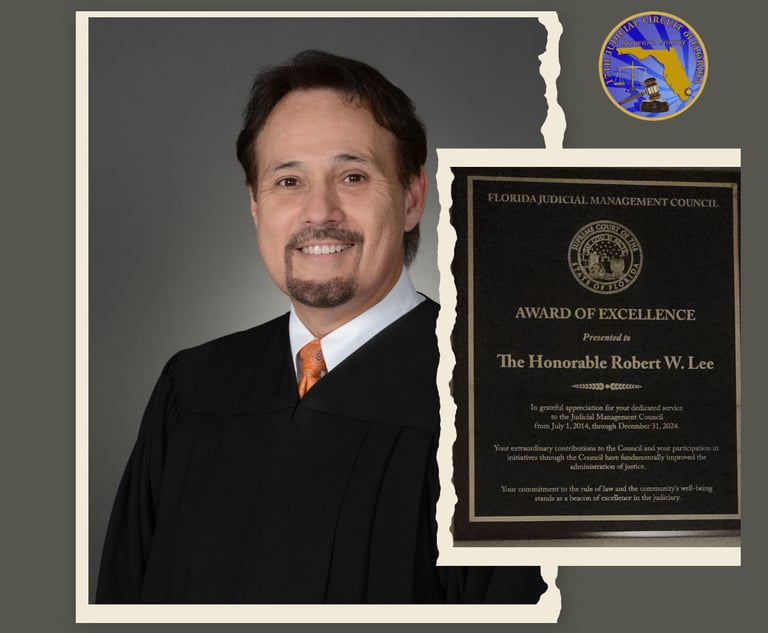Broward Judge Removed From Case Over 'Due Process' Considerations
"We are compelled to grant the husband's petition for writ of prohibition," the appellate panel wrote.
May 25, 2023 at 02:01 PM
5 minute read
 Credit: Mincemeat/Adobe Stock
Credit: Mincemeat/Adobe Stock
Florida's Fourth District Court of Appeal removed a Broward judge from a case, even though it noted his "understandable frustration" with a case in which he had already allotted three hours to what is typically an hourlong proceeding.
But in the end, the panel agreed with the litigant that the trial judge had denied him due process, and "did not allow him to present his case-in-chief."
Broward County Circuit Judge Michael Davis had been presiding over a divorce between Ivan Domnin as the petitioner and his wife Oksana Domnina.
 Judge Michael Davis of the Broward County Court. Courtesy photo
Judge Michael Davis of the Broward County Court. Courtesy photo In the appeal, the jurists weighed in on the husband's petition for writ of prohibition, and granted the request.
"We can appreciate the circuit court judge's understandable frustration, expressed several times during the hearing, regarding the hearing's length, and what the circuit court judge perceived as the parties' lack of focus on the required factual determinations to be made on the motion," the appellate panel wrote.
At trial, for instance, Davis noted in the court transcript that the court typically gives about an hour for these types of hearings. "We have now had over three. It's a balancing test between the needs for both parties," the lower court judge said.
 Judge Jonathan D. Gerber of the Fourth District Court of Appeal. Courtesy photo
Judge Jonathan D. Gerber of the Fourth District Court of Appeal. Courtesy photo But in the granting the writ, Judge Jonathan D. Gerber wrote, "Our review of the transcript indicates that the hearing's length was attributable to a variety of factors: the husband's trial counsel's arguments at the hearing's outset on whether and how a foreign judgment affected the circuit court's consideration of the wife's motion; detailed witness examinations during the wife's case-in-chief by both the wife's trial counsel and the husband's trial counsel; and the difficulties inherent in conducting a Zoom hearing requiring interpreters."
However, Gerber said, when the hearing's allotted time had expired, Davis requested the parties submit written closing arguments, even though the husband had not been given the opportunity to present his case-in-chief.
Click here to read the full appellate opinion
Like the appellate court, a University of Miami law professor also disagreed with the trial judge.
 Tamara Rice Lave is a professor of law at the University of Miami School of Law. Courtesy photo
Tamara Rice Lave is a professor of law at the University of Miami School of Law. Courtesy photo "Judge Davis' action was outrageous, and the Fourth District Court of Appeal did the right thing in quashing Davis' order and directing that the matter be assigned to a different circuit court judge," said Tamara Rice Lave, who specializes in criminal law, criminal procedure and evidence. "It's important to understand that the Fourth District was not taking a position on the merits of the underlying case. They were simply ensuring that each party enjoys their constitutional right to due process of law."
Another observer agreed.
Jan Jacobowitz, legal expert and professor at the University of Miami, said, "The judge's perhaps understandable frustration resulted in a decision that the Fourth DCA concluded was a violation of due process, therefore, the Fourth DCA 'righted the ship,' so to speak, in providing due process."
The appellate ruling noted that after the parties submitted their written closing arguments, Davis entered a detailed order making findings of fact, and granting the wife's motion for temporary alimony and temporary attorney fees.
 Jan Jacobowitz, legal expert and professor at the University of Miami. Courtesy photo
Jan Jacobowitz, legal expert and professor at the University of Miami. Courtesy photo Gerber noted in the ruling that the husband's counsel stated: "I would request that the court hold off on allowing closing arguments for us to present our case-in-chief. It's a due process concern."
Regardless, the circuit court judge entered an order denying the husband's motion for disqualification as legally insufficient, court records show.
Two days later, the husband filed a motion to disqualify the circuit court judge, basing his argument on various authorities, including a decision based on a previous Fourth DCA ruling in 2014 in Castillo v. Castillo, said Gerber, with Judges Alan O. Forst and Ed Artau concurring.
"Again, we can appreciate the circuit court judge's frustration and desire to manage the very busy docket which our trial judges face every day. And from our review of the transcript, this hearing could have—and should have—taken less time," Gerber said. "However, the circuit court's termination of the hearing without the husband having been given an opportunity to present his case-in-chief before the circuit court ruled on the wife's motion was a denial of due process."
In the end, the panel remanded, with instructions to assign the case to another trial judge.
"We are compelled to grant the husband's petition for writ of prohibition, consistent with our holding in Castillo," Gerber concluded.
Attorneys for both parties did not return emails for comment. They were listed as Andre G. Raikhelson of Trayber Raikhelson Law Group in Boca Raton, for the husband as petitioner, and Meaghan K. Marro of Marro Law in Plantation, for the wife as respondent.
This content has been archived. It is available through our partners, LexisNexis® and Bloomberg Law.
To view this content, please continue to their sites.
Not a Lexis Subscriber?
Subscribe Now
Not a Bloomberg Law Subscriber?
Subscribe Now
NOT FOR REPRINT
© 2025 ALM Global, LLC, All Rights Reserved. Request academic re-use from www.copyright.com. All other uses, submit a request to [email protected]. For more information visit Asset & Logo Licensing.
You Might Like
View All
A Judge Ordered Squabbling Lawyers to Have Lunch: Here's What Happened

Sorry. We Can't Get to Your Case: Judge Speaks Out on Judicial Shortages

Trailblazing Broward Judge Retires; Legacy Includes Bush v. Gore

'Serious Disruptions'?: Federal Courts Brace for Government Shutdown Threat
3 minute readTrending Stories
Who Got The Work
J. Brugh Lower of Gibbons has entered an appearance for industrial equipment supplier Devco Corporation in a pending trademark infringement lawsuit. The suit, accusing the defendant of selling knock-off Graco products, was filed Dec. 18 in New Jersey District Court by Rivkin Radler on behalf of Graco Inc. and Graco Minnesota. The case, assigned to U.S. District Judge Zahid N. Quraishi, is 3:24-cv-11294, Graco Inc. et al v. Devco Corporation.
Who Got The Work
Rebecca Maller-Stein and Kent A. Yalowitz of Arnold & Porter Kaye Scholer have entered their appearances for Hanaco Venture Capital and its executives, Lior Prosor and David Frankel, in a pending securities lawsuit. The action, filed on Dec. 24 in New York Southern District Court by Zell, Aron & Co. on behalf of Goldeneye Advisors, accuses the defendants of negligently and fraudulently managing the plaintiff's $1 million investment. The case, assigned to U.S. District Judge Vernon S. Broderick, is 1:24-cv-09918, Goldeneye Advisors, LLC v. Hanaco Venture Capital, Ltd. et al.
Who Got The Work
Attorneys from A&O Shearman has stepped in as defense counsel for Toronto-Dominion Bank and other defendants in a pending securities class action. The suit, filed Dec. 11 in New York Southern District Court by Bleichmar Fonti & Auld, accuses the defendants of concealing the bank's 'pervasive' deficiencies in regards to its compliance with the Bank Secrecy Act and the quality of its anti-money laundering controls. The case, assigned to U.S. District Judge Arun Subramanian, is 1:24-cv-09445, Gonzalez v. The Toronto-Dominion Bank et al.
Who Got The Work
Crown Castle International, a Pennsylvania company providing shared communications infrastructure, has turned to Luke D. Wolf of Gordon Rees Scully Mansukhani to fend off a pending breach-of-contract lawsuit. The court action, filed Nov. 25 in Michigan Eastern District Court by Hooper Hathaway PC on behalf of The Town Residences LLC, accuses Crown Castle of failing to transfer approximately $30,000 in utility payments from T-Mobile in breach of a roof-top lease and assignment agreement. The case, assigned to U.S. District Judge Susan K. Declercq, is 2:24-cv-13131, The Town Residences LLC v. T-Mobile US, Inc. et al.
Who Got The Work
Wilfred P. Coronato and Daniel M. Schwartz of McCarter & English have stepped in as defense counsel to Electrolux Home Products Inc. in a pending product liability lawsuit. The court action, filed Nov. 26 in New York Eastern District Court by Poulos Lopiccolo PC and Nagel Rice LLP on behalf of David Stern, alleges that the defendant's refrigerators’ drawers and shelving repeatedly break and fall apart within months after purchase. The case, assigned to U.S. District Judge Joan M. Azrack, is 2:24-cv-08204, Stern v. Electrolux Home Products, Inc.
Featured Firms
Law Offices of Gary Martin Hays & Associates, P.C.
(470) 294-1674
Law Offices of Mark E. Salomone
(857) 444-6468
Smith & Hassler
(713) 739-1250






